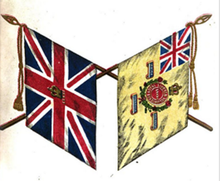81st Foot
| 81st (Loyal Lincoln Volunteers) Regiment of Foot | |
|---|---|

Colours of the 81st (Loyal Lincoln Volunteers) Regiment of Foot
|
|
| Active | 1793–1881 |
| Country |
|
| Branch |
|
| Type | Infantry Regiment |
| Role | Infantry |
| Garrison/HQ | Fulwood Barracks, Lancashire |
| Motto(s) | Loyaute m'oblige |
| March | "The Red, Red Rose" and "The Lincolnshire Poacher" |
| Engagements |
French Revolutionary Wars Napoleonic Wars Second Anglo-Afghan War |
The 81st Regiment of Foot (Loyal Lincoln Volunteers) was an infantry regiment of the British Army, raised in 1793. Under the Childers Reforms it amalgamated with the 47th (Lancashire) Regiment of Foot to form the Loyal North Lancashire Regiment in 1881.
The regiment was raised by Major General Albermarle Bertie as the Loyal Lincoln Volunteers, in response to the threat posed by the French Revolution, on 23 September 1793. However, no levy money would be provided. The original compliment was composed of the Militia of Lincoln volunteering to serve in the new regiment: the regiment was embodied in January 1794. On 25 January 1794, the Loyal Lincoln Volunteers were redesignated as the 81st Regiment of Foot. The regiment was quartered in Lincoln and Gainsborough. The first commander was Lieutenant Colonel Lewis.
After a year's service in Ireland, the regiment was detailed to serve under Major-General Ralph Abercromby in the West Indies. The regiment sailed from Southampton and arrived in the West Indies in March 1794. The regiment was sent as reinforce British operations on Saint-Domingue in what is now the Haiti. As was common during the era, the European troops of the regiment suffered heavily from tropical diseases, in particular yellow fever. By November 1795, less than a year after, the regiment's losses to illness were so heavy that it was temporarily amalgamated with another battalion, of the 32nd Regiment, to produce a unit that would be combat effective. Despite the capture of the French defences at Bompard, the British Expedition to St. Dominque was a failure. In April 1797, the regiment was ordered to return to the England.
After returning home from the West Indies, the regiment spent much of the year recruiting and refitting. The regiment was made part of the garrison for Guernsey beginning in October 1797. During this time, the rank and file took up a subscription to help support the war effort, each non-commissioned officer and enlisted man contributing between two and seven days pay to the war effort.
...
Wikipedia
